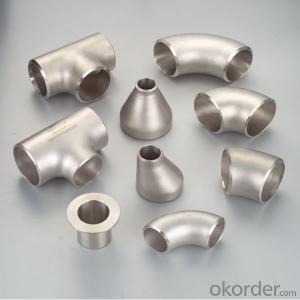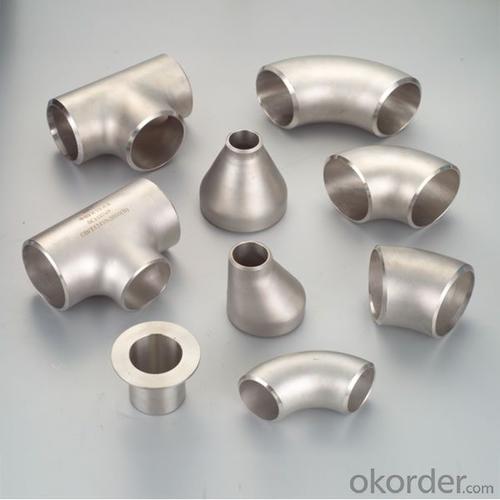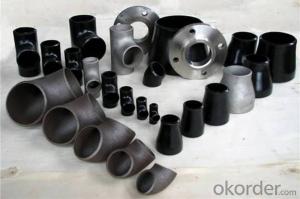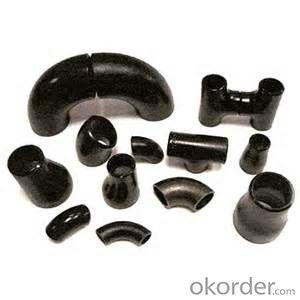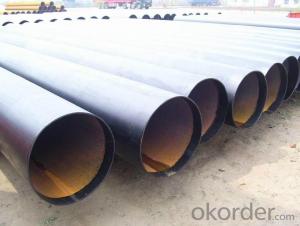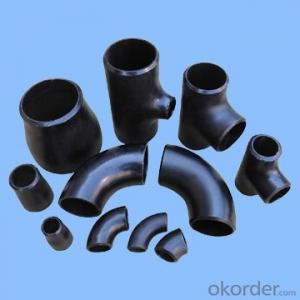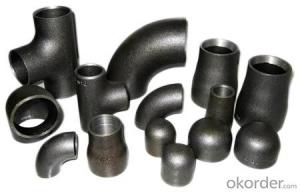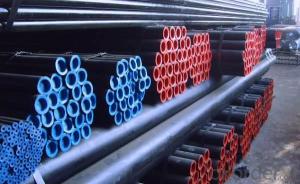10'' carbon steel pipe fittings ISO/ BS EN/DIN/ API
- Loading Port:
- Tianjin
- Payment Terms:
- TT OR LC
- Min Order Qty:
- 5 m.t
- Supply Capability:
- 300 m.t/month
OKorder Service Pledge
OKorder Financial Service
You Might Also Like
Products Detailed Description
Products | pipe fittings elbows, bends,tees, reducers caps |
Size | 1/2" - 48" |
Wall thickness | Sch5-Sch160 XXS |
Standard | ANSI, ASME API5L, OCT, DIN and JIS, etc. |
we can also produce according to drawing and standards provided by customers. | |
Material | Carbon steel, alloy steel and stainless steel. |
We can produce according to materials appointed by consumers. | |
Packaging | Plywood Cases,plywood pallet, plastic bag or as customers requirement |
Surface Treatment | Shot blasted, rust-proof black oil |
Delivery Time | 10-60 days |
Quality | First grade |
Others | 1.Special design available according to your drawing. |
2.anti-corrosion and high-temperature resistant with black painting | |
3. All the production process are made under the ISO9001:2000 strictly. | |
4. A conformity rate of ex-factory inspection of products. |
Specifications
Ansi B16.9 WPB carbon steel pipe fitting elbow tee reducer
Size:Seamless 1/2"-24" Welded 1/2"-48"
ANSI B16.9 WPB carbon steel pipe fitting elbow tee reducer
1.Size: Seamless 1/2"-24" Welded 1/2"-48"
2. WT: SGP, STD, SCH40, SCH80, SCH100,SCH120,SCH160,XS,XXS
3. Material:
stainless steel Grade: 201,304,304L,316,316L,317,317L,904L,and etc
carbon steel Grade: WPB,GRB, Q235,16MN
Alloy steel: st35.8,st52,wp11,wp22,wp12 wp l6
4. Standard: ASTM/AISI/DIN/JIS
5. Type: Concentric and eccentric
6. Surface treatment: Transparent oil, rust-proof black oil
7. Applications range: Applications range: for use in the petroleum, smelting, foodstuff, power, papermaking, chemical, medical equipment,aviation, boiler heat exchanger, and other fields
8. Packing: wooden case or as per customers' requirement
- Q: How are steel pipes protected against electrolytic corrosion?
- Steel pipes are protected against electrolytic corrosion through a variety of methods. One common method is the application of protective coatings on the surface of the pipes. These coatings act as a barrier, preventing direct contact between the steel and the surrounding environment, which includes moisture and other corrosive substances. Coatings such as epoxy, polyethylene, and zinc are commonly used for this purpose. Another method of protection is the use of sacrificial anodes. Sacrificial anodes are made from a metal that is more reactive than steel, such as zinc or aluminum. These anodes are attached to the steel pipes and, as they corrode over time, they sacrifice themselves to protect the steel. This process is known as cathodic protection and is highly effective in preventing electrolytic corrosion. In addition to coatings and sacrificial anodes, proper insulation and electrical isolation are crucial in protecting steel pipes from electrolytic corrosion. Insulating materials, such as rubber or plastic sleeves, are used to prevent direct contact between the pipes and other metals or electrolytes. Electrical isolation can be achieved through the use of dielectric unions or insulating flanges, which prevent the flow of electric current between different sections of the pipeline. Regular maintenance and inspection also play a key role in protecting steel pipes against electrolytic corrosion. Periodic checks for coating integrity, anode condition, and potential electrical leakage are essential to ensure the continued effectiveness of the corrosion protection system. Overall, a combination of protective coatings, sacrificial anodes, insulation, electrical isolation, and regular maintenance is necessary to protect steel pipes against electrolytic corrosion. By implementing these measures, the lifespan of steel pipes can be significantly extended, ensuring the safety and reliability of various applications such as water distribution, oil and gas transportation, and structural support in buildings and infrastructure.
- Q: What are the safety precautions to follow while working with steel pipes?
- When working with steel pipes, it is important to follow certain safety precautions to ensure a safe working environment. Here are some key safety measures to consider: 1. Personal Protective Equipment (PPE): Always wear appropriate PPE, including safety goggles, gloves, steel-toed boots, and a hard hat. This will protect you from potential hazards such as falling objects, sharp edges, or flying particles. 2. Use proper lifting techniques: Steel pipes can be heavy and awkward to handle. Use proper lifting techniques, such as bending your knees and using your legs to lift, to avoid straining your back or causing musculoskeletal injuries. 3. Secure the work area: Clear the work area of any clutter or obstacles that could pose a tripping hazard. Ensure that the pipes are properly stored and secured to prevent them from rolling or falling. 4. Be cautious of sharp edges: Steel pipes often have sharp edges, which can cause cuts or punctures. Handle them with care and consider using protective covers or gloves to avoid injuries. 5. Use appropriate tools: Utilize the correct tools and equipment for cutting, welding, or manipulating steel pipes. Follow manufacturer instructions and guidelines to ensure safe usage. 6. Avoid working in confined spaces: Working in confined spaces poses serious risks. If it is necessary to work in such an area, ensure proper ventilation and follow confined space entry protocols to prevent asphyxiation or other hazards. 7. Follow proper welding procedures: If welding is involved, follow proper welding procedures and ensure proper ventilation in the workspace. Use fire-resistant blankets or screens to protect nearby combustible materials. 8. Be aware of hot surfaces: Steel pipes can become hot during welding or other processes. Use appropriate insulation or heat-resistant gloves to protect yourself from burns or heat-related injuries. 9. Establish communication: Establish clear communication channels with colleagues when working with steel pipes, especially when lifting or moving heavy objects. Use hand signals or verbal communication to ensure everyone is on the same page and to prevent accidents. 10. Regularly inspect tools and equipment: Before starting any task, inspect tools, equipment, and scaffolding for any damage or defects. Report and replace any faulty equipment to prevent accidents. Remember, safety is paramount when working with steel pipes. By following these precautions and using common sense, you can ensure a safe working environment for yourself and your colleagues.
- Q: Can steel pipes be used for underground cooling systems?
- Indeed, underground cooling systems can make use of steel pipes. Thanks to their durability, strength, and resistance to corrosion, steel pipes are widely employed in numerous applications, including underground cooling systems. They are adept at handling the rigorous demands of cooling systems, such as high pressure and temperature requirements. Moreover, steel pipes can be conveniently installed and maintained by means of welding or threading them together. Nonetheless, it is crucial to ensure that the steel pipes are adequately coated or insulated in order to avert corrosion and uphold heat transfer efficiency.
- Q: Can steel pipes be used for underground water lines?
- Yes, steel pipes can be used for underground water lines.
- Q: How to distinguish between steel pipe and spiral pipe material?
- Steel pipe according to the pipe material (ie steel) can be divided into: carbon tube and alloy tube, stainless steel tube.Carbon tube can be divided into ordinary carbon steel tube and high quality carbon structure tube.
- Q: What is the difference between standard wall thickness and extra-strong wall thickness steel pipes?
- The difference between standard wall thickness and extra-strong wall thickness steel pipes lies in the thickness of the pipe walls. Standard wall thickness pipes have a thinner wall compared to extra-strong wall thickness pipes, which have a thicker wall. The increased wall thickness in extra-strong pipes enhances their strength and durability, making them suitable for applications that require higher pressure or load-bearing capacities.
- Q: Can steel pipes be used for water supply networks?
- Yes, steel pipes can be used for water supply networks. They are commonly used for water distribution due to their durability, strength, and corrosion resistance. However, proper coating and maintenance are essential to prevent rusting and ensure the longevity of the steel pipes in water supply systems.
- Q: How are steel pipes used in seaport infrastructure?
- Steel pipes are extensively used in seaport infrastructure for various purposes such as constructing piers, offshore platforms, and docking facilities. They are commonly used for building underwater foundations, pilings, and support structures that provide stability and strength to the port infrastructure. Steel pipes are also used in the construction of pipelines, drainage systems, and water supply networks within the seaport, ensuring efficient transportation of goods and materials. Overall, steel pipes play a crucial role in maintaining the structural integrity and functionality of seaport infrastructure.
- Q: Can steel pipes be used for fencing?
- Yes, steel pipes can be used for fencing. Steel pipes are durable, strong, and resistant to corrosion, making them an excellent choice for fencing applications. They can be used to create secure and long-lasting fences in various settings, such as residential, commercial, or industrial properties.
- Q: What is the impact resistance of steel pipes?
- Steel pipes have a high level of impact resistance thanks to the natural properties of steel. Steel, known for its strength and durability, can endure substantial external forces and impacts without deforming or breaking. The impact resistance of steel pipes is further improved by their construction and design. Various manufacturing techniques, such as seamless or welded construction, are used to create steel pipes, ensuring uniformity and strength throughout the structure. This construction process eliminates weak points or seams that could compromise the pipe's impact resistance. Additionally, steel pipes can be customized to meet specific impact resistance requirements based on their intended use. Different grades and types of steel can be utilized to achieve varying levels of impact resistance, allowing for customization to suit different industries and environments. The excellent impact resistance of steel pipes is particularly advantageous in industries such as construction, oil and gas, and transportation. These industries subject pipes to heavy loads, pressure, and potential impacts. Steel pipes can withstand these harsh conditions, making them a dependable choice for a wide range of applications. To summarize, steel pipes have outstanding impact resistance due to the inherent strength and durability of steel, as well as the construction techniques employed during manufacturing. Steel pipes can withstand significant external forces and impacts, making them a reliable and sturdy option for various industries and applications.
Send your message to us
10'' carbon steel pipe fittings ISO/ BS EN/DIN/ API
- Loading Port:
- Tianjin
- Payment Terms:
- TT OR LC
- Min Order Qty:
- 5 m.t
- Supply Capability:
- 300 m.t/month
OKorder Service Pledge
OKorder Financial Service
Similar products
Hot products
Hot Searches
Related keywords
